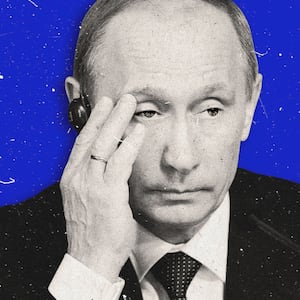Russia’s foreign minister has warned Western powers not to underestimate the “real” risk of nuclear conflict if they continue to funnel weapons to Ukraine in what he says is an undeclared proxy war.
Within hours of his remarks, explosions were heard inside the sovereign borders of Moldova. Ukrainian officials believe Russia is launching “false flag” operations in the pro-Russian rebel-controlled enclave of Transnistria in order to justify widening its imperial assault into a second nation.
The warning from Sergei Lavrov, in a state TV interview late on Monday night, represents a dramatic rhetorical escalation from the Kremlin in the face of an increasingly assertive international response to the Ukraine crisis.
ADVERTISEMENT
His comments drew a sharp reply from Lavrov’s counterpart in Kyiv, Dmytro Kuleba, who said Russia had lost its “last hope to to scare the world off supporting Ukraine… This only means Moscow senses defeat in Ukraine.”
Lavrov, the stony-faced veteran of Russian diplomacy, was asked in the interview about the risks of the Ukraine crisis spiraling into nuclear conflict, as so nearly happened with the Cuban Missile Crisis of 1962.
“The risks now are considerable,” he said. “I would not want to elevate those risks artificially. Many would like that. The danger is serious, real. And we must not underestimate it,” Lavrov said.
“NATO, in essence, is engaged in a war with Russia through a proxy and is arming that proxy. War means war.”
Lavrov was speaking the day after U.S. Defense Secretary Lloyd Austin and Secretary of State Antony Blinken met face to face in Kyiv with President Volodymyr Zelensky, promising yet more military aid.
After initial hesitation from the Biden administration, reluctant to send weapons onto the battlefields of Ukraine only for them to end up in Russia’s hands, America is now all-in on its support for Kyiv, hopeful that victory for Ukraine could neutralize the Russian conventional military threat for a generation.
On Tuesday, Austin was scheduled to host a meeting of 40 allied defence ministers at the Ramstein air base in Germany to coordinate the international response to the Russian aggression and guarantee a steady supply of heavy weaponry, air defense systems, and ammunition to the Ukrainian army. In a significant move, Germany, which has so far refused to supply heavy weaponry to Kyiv, is expected to confirm that it will send 50 anti-aircraft tanks.
The Russian invasion was launched two months ago, on Feb. 24, after President Vladimir Putin ordered a “special operation” to “denazify” Ukraine and liberate Russian-speaking towns and cities.
The original plan, as formulated by Putin and his generals, was for the Ukrainian capital Kyiv to be in Russian hands within three or four days, with Zelensky either killed or run out of town.
Five weeks later, with thousands of Russians killed and its forces devastated by the tactically superior Ukrainian defenders, Russia was forced to admit defeat in the battle for Kyiv and refocus its offensive more clearly in southern and eastern Ukraine to take control of the Donbas and create a land bridge from southern Russia along the Black Sea coast to Odesa.
Another element in the Russian war plans became clearer last week when a Russian general, Rustam Minnekaev, let slip that the proposed “land corridor” would stretch all the way to Moldova, entirely cutting Ukraine off from access to the sea.
Under those plans, Russia’s military control would stretch all the way into the breakaway Moldovan region of Transnistria, where Russian-backed separatists declared independence 30 years ago and where Russia still has a military base.
Moldova, which is constitutionally neutral, has done its best not to be drawn into the conflict—but Russia seems determined to drag in the former Soviet republic, which lies just to the West of Ukraine.
On Monday, assailants fired rocket-propelled grenades at an empty security service building in Tiraspol, the Transnistrian capital. Officials in Moldova and Ukraine dismissed it as a Russian “false flag” operation. An RPG launcher discarded at the scene, of a type used by Russia and not Ukraine, clearly bore a “Z” symbol.
Early on Tuesday, explosions destroyed two nearby communications towers used to rebroadcast Russian radio and TV stations around the region—not targets the Russians would choose for a provocation.
The breakaway region, which has been funded by Russia for decades, has a population of almost half a million, a third of whom identify as Russian, but with large Moldovan and Ukrainian minorities. Long queues quickly built up at the main border crossing into Moldova after Tuesday's attacks, fueled by fears that the Russians could try to mobilize the local population to help fight in Ukraine.
Later on Tuesday, Putin was due to meet in Moscow with UN Secretary-General Antonio Guterres—much to the anger of the Ukrainian government, which says he has no mandate to negotiate on their behalf.







